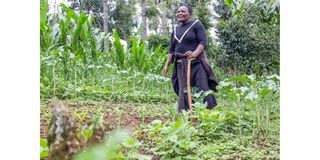A day in the life of farmer feeding Kisii town

Jane Nyangenya her farm in Bobaracho Nyaribari Chache in Kisii County on October 12, 2021. The mother of six has planted coffee on the periphery of her farm where she practices mixed farming.
What you need to know:
- For a decade, Jane Nyangenya has practiced mixed farming.
- She grows tea leaves, coffee, bananas, traditional vegetables namely managu and chinsaga, beans, kales and Napier grass for her dairy cows on her four-acre piece of land.
- This kind of farming has helped her raise her children who are now adults, take care of her two grandchildren and two orphans.
The death of her husband in 2011, meant that she had to work extra hard to raise her six children.
She grows tea leaves, coffee, bananas, traditional vegetables namely managu and chinsaga, beans, kales and Napier grass for her dairy cows on her four-acre piece of land.
For a decade, Jane Nyangenya, 66, has practiced mixed farming.
This kind of farming has helped her raise her children who are now adults, take care of her two grandchildren and two orphans.
With no proper record keeping, Ms Nyangenya is able to save close to Sh10,000.
“I earn about Sh10,000 from my farm after subtracting all expenses. It is tough, but I keep trying,” she says.
Ms Nyangena wakes up at 5am every day, except on Saturday, her day of worship. Her first task is to milk her cows then prepare breakfast for her grandchildren and the two orphans who were left behind by her sister.
She then heads to her small tea plantation, located a few metres from her semi-permanent house.

For a decade, Jane Nyangenya has practiced mixed farming.
On the periphery of her farm, she has planted coffee.
Right outside her house is a zero grazing unit that houses three cows and next to the unit, is a chicken shed.
She is one of the few women in the locality who have embraced mixed farming to eke a living. Many widows, unfortunately, survive by brewing local liquors.
It is the only enterprise that has helped her educate two of her last born children up to university following the death of her husband.
“I like what I am doing, though it is exhausting, it earns me my daily bread,” she says.
When Nation pays her a visit in her Bobaracho home, Nyaribari Chache Constituency, Kisii County, she is elated to share her busy schedule in the shamba.
To this woman, waking up at 5am helps her to attend to her many crops. She gets into the farm at 8am and picks tea up to noon, before returning home to prepare lunch.
“I return to the farm late afternoon to tend to my vegetables. On many occasions, I have three employees who assist me in the farm. I pay each Sh200 daily,” says Ms Nyangenya.
Not even old age has deterred her from working on her farm, whose crops are healthy and weed-free, till evening. She, however, admits that the vigour with which she started is gradually slowing down.
Since she keeps cattle, the mother of six uses organic manures to grow her crops and this has helped her cut down on the cost of buying inorganic fertilisers which are costly.
Mama mbogas always throng her home on the eve of market days to buy from her, and most of the vegetables sold by vendors in Kisii town come from her farm.






